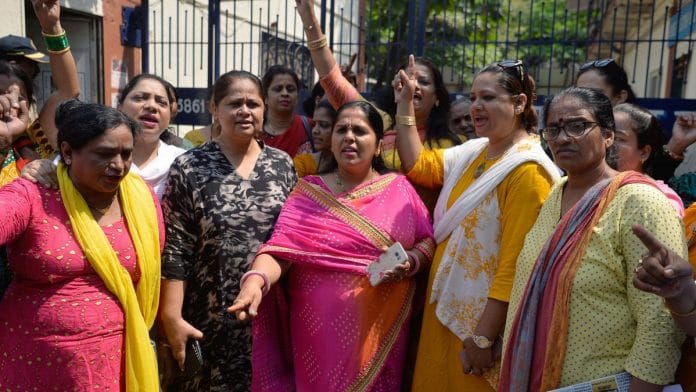Sexual Harassment at Workplace law does not allow complaints to be filed more than three months after the incident.
New Delhi: Women and child development minister Maneka Gandhi has announced a committee of legal experts to guide the government on the allegations thrown up by the #MeToo campaign, which has seen a host of influential names being accused of sexual harassment and assault.
Among other things, the committee will advise the women and child development ministry on how to strengthen the legal and institutional framework for sexual harassment.
“I truly welcome the movement and see why women are angry right now,” Gandhi had told ThePrint a day before she announced the committee. “I think after naming their accusers, women should file complaints and pursue the matter legally.”
“After all, even Tanushree Dutta has gone ahead and filed an FIR,” she added.
Asked about her efforts to erase the deadline for reporting sexual crimes, she said, “I don’t think as victims of sexual violence, women or children forget the circumstances… so they should seek justice legally.”
Also read: Panel of senior judges & legal experts plan to look into #MeToo complaints: Maneka Gandhi
As harrowing #MeToo accounts began to deluge social media over the past two weeks, the National Commission for Women (NCW) stepped in Wednesday and urged women to lodge written complaints against their perpetrators with the authorities, including the commission itself.
‘The law needs to keep up’
But the suggestion that the women leading #MeToo should also pursue the cases legally – also offered, among others, by the movement’s critics – throws up more than a few hurdles.
For one, while the movement has helped uncover harassment cases from back in the day, the law does not allow complaints of sexual harassment to be filed more than three months after the incident took place.
According to Section 9(1) of the Sexual Harassment at Workplace Act, 2013, “Any aggrieved woman may take, in writing, a complaint of sexual harassment at workplace to the internal committee if so constituted, or the local committee, in case it is not constituted within a period of three months from the date of the incident and in case of a series of incidents, within a period of three months from the date of the last incident.”
Also read: Tarun Tejpal’s gaming of legal system shows why #MeToo doesn’t believe in due process
Speaking to ThePrint, retired Justice Sujata Manohar, who was part of the three-judge Supreme Court bench that paved the way for the Vishaka Guidelines in 1997, said the law needed to keep up with the questions being thrown up by the movement.
“It is important that the movement is backed by a criminal provision,” she added.
#MeToo has opened up a space for women that the law cannot
Given the paucity of evidence in cases of sexual harassment, gaslighting and the emotional, financial and professional cost of taking the legal route, experts say filing complaints may not be the ideal option for many women.
A woman, whose complaint against a senior male colleague was still being inquired into, told ThePrint that the movement had given her second thoughts. “I regret filing a complaint…I am looking at all these women on social media, and their word is being taken at face value,” she said.
“I, on the other hand, have to sit and try and prove that he called me names and pinched me and so on… Where do I get the proof from?” she added.
Also read: #MeToo is necessary but not the final answer, says judge behind Vishakha Guidelines
Does a movement like #MeToo then require a fundamental overhaul in the way “justice” is defined?
Lawyer and RSS member Raghav Awasthi said he thought it does. “#MeToo is not about legal justice,” he said. “In some cases, women can go ahead and file complaints, but that is not what the movement intrinsically is.”
“The movement is about women breaking their inhibitions and speaking out against authority figures, so that even if they are asked ‘why didn’t you speak up 10 years ago’, other women don’t have to wait so long,” he added.
Senior journalist Saba Naqvi, one of the 10 women to speak out against union minister and former journalist M.J. Akbar, too believes #MeToo’s success may not necessarily be defined by law.
“#MeToo has clearly achieved something beyond what the law has or can…While the law deals with individual cases, #MeToo has become this collective of women, who are saying you cannot shame the victim,” she said.
Speaking of her own case, she added, “I, for example, only spoke up because there were some anonymous accounts against him (Akbar) and I wanted to add weight to the voices of young women.”
“I would like the ethics committee of Parliament to take this up, but essentially this movement is about telling women that a certain person is a serial predator, the shame is his, not yours,” she said.
As #MeToo begins to shake up the toxicity that often pervades gender relations at the workplace and seeks to reverse the power structure, the law, much like the society at large, will just have to catch up, Awasthi said.
“Surely, there are many things the law will have to learn when it comes to #MeToo…The law will evolve along with society,” he added.







Shri Raghav Awasthi is right. Only a few cases will go to trial. However, Me Too is collecting scalps. I had thought Bollywood would be the most obdurate holdout. However, even here results are visible. Women should continue to speak, with a full sense of responsibility. False or frivolous complaints will tarnish the movement, so the women who are at the forefront – all praise to them – will need to devise some filters. The greatest contribution of this movement will be that it will make working spaces more safe and secure for women. Jai ho …